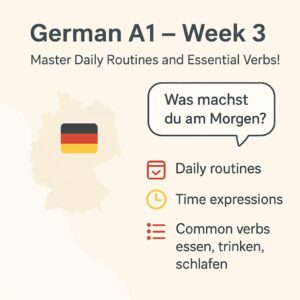Welcome to Thinkerstonic German – Week 3: Mastering German Vocabulary and Expressions
Welcome to Thinkerstonic German, your trusted resource for learning the German language! In Week 3, we’ll build on the foundation you’ve established and dive deeper into key aspects of the language. This week’s focus includes personal introductions, daily routines, and reading comprehension, all designed to help you confidently navigate everyday German conversations.
Let’s get started!
1. Mein Lehrbuch: Meine Persönlichen Daten (Personal Data)
In this section, we focus on introducing yourself and discussing your personal information. You’ll learn how to express your name, age, nationality, and profession in German. This is a crucial skill for engaging in basic conversations and connecting with others in Germany.
-
What You’ll Learn:
-
How to say “My name is…” and introduce yourself in German.
-
Talking about your nationality, age, and profession.
-
Vocabulary related to personal data and simple introductions.
-
-
Key Vocabulary: Name, age, nationality, profession, address, etc.
-
Cultural Context: In German-speaking cultures, it’s common to ask about your name, nationality, and job. Knowing how to answer these questions will allow you to engage in smooth, everyday interactions.
🎯 Goal for This Section: By the end of this part, you’ll be able to introduce yourself and discuss personal details like your name, age, and occupation in German.
2. Mein Arbeitsbuch: Exercises for Reinforcement
The Mein Arbeitsbuch (My Workbook) section offers a variety of practical exercises to reinforce the material from the textbook. Here, you’ll focus on applying what you’ve learned through fill-in-the-blank activities, sentence construction, and vocabulary drills.
-
What You’ll Learn:
-
How to apply vocabulary and grammar in practice through interactive exercises.
-
Constructing simple sentences about yourself and others.
-
Strengthening your sentence structure and grammar skills.
-
🎯 Goal for This Section: By the end of this section, you will have reinforced the vocabulary and grammar from Lektion 1-2, helping you build confidence in using them in conversation.
3. Wir Beginnen Lektion 3: Starting Lektion 3
In Lektion 3, we shift gears and begin discussing daily routines. This section introduces essential verbs and time-related vocabulary that will help you talk about your daily activities, such as eating, drinking, working, and sleeping.
-
What You’ll Learn:
-
Vocabulary related to daily routines (e.g., eating, drinking, working).
-
Time expressions like “am Morgen” (in the morning), “um 5 Uhr” (at 5 o’clock).
-
Grammar focus: Present tense conjugation of verbs like essen (to eat), trinken (to drink), and schlafen (to sleep).
-
🎯 Goal for This Section: By the end of this lesson, you should be able to discuss your daily routine in German and use time expressions to explain when you do certain activities.
4. Wir Lesen Lektion 3: Reading Practice
This section focuses on reading comprehension. You will engage with a simple German text, applying vocabulary and grammar from earlier in the week. The goal is to practice extracting key information from a German text and to enhance your reading skills.
-
What You’ll Learn:
-
How to read and understand basic German texts related to daily life.
-
Expanding vocabulary through context and sentence structure.
-
Improving your ability to understand German through reading comprehension exercises.
-
🎯 Goal for This Section: By the end of this section, you’ll be able to read and understand short German texts, applying your vocabulary knowledge in context.
Conclusion
Congratulations on completing Week 3! This week has helped you build essential skills to introduce yourself, discuss your daily routine, and read simple German texts. Keep practicing, and don’t forget to review the exercises in your workbook to reinforce what you’ve learned.
We look forward to seeing you next week for more exciting lessons in Thinkerstonic German!
Assignment PDF:
You can download the assignment PDF below, which contains the full set of instructions and exercises.
